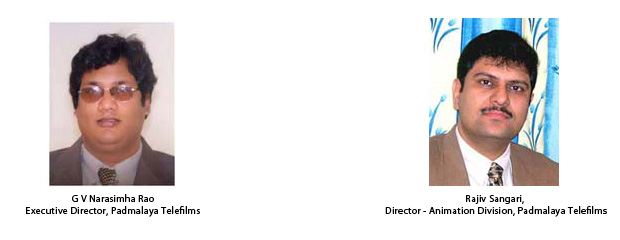 Outsourcing of animation is said to be the boom town for India. Almost every other day newspaper headlines scream about some deal being struck between an Indian company and either a Disney or a Nickelodeon or some other animation company in the US, Canada or Europe. Media pundits have been prophesying how Indian animation is going to find its place on the international scenario not today but at least tomorrow.
Outsourcing of animation is said to be the boom town for India. Almost every other day newspaper headlines scream about some deal being struck between an Indian company and either a Disney or a Nickelodeon or some other animation company in the US, Canada or Europe. Media pundits have been prophesying how Indian animation is going to find its place on the international scenario not today but at least tomorrow.
Among the companies which have hit the limelight recently is the Zee Telefilms owned Padmalaya Telefilms. It announced a tieup with Italy’s Mondo and Scottish firm Mallard Media at the MipTV festival in Cannes last month. Animation Express’ Anand Gurnani met up with PTL Executive Director G V Narasimha Rao and director for animation Rajiv Sangari, to get their take on where they feel India’s Animation Industry is headed and what could hinder its progress to the top.
Excerpts:
What is the size of the Indian Animation industry today in terms of turnover and number of studios? Also what do you think is its area of expertise?
(Smiles) I guess no one can give the right figure. There are many figures and estimates that you get to hear, but reaching even at a ballpark figure is not possible. You can count on your fingers the number of established studios in India. As far as the area of expertise goes India’s USP is pricing, language and flexibility.
Amongst the three factors that you mentioned which one is the clinching factor? A number of Asian countries like China , Philippines, Korea , Taiwan are in the fray, what’s India got that they don’t?
‘Clootie and Dumpling’
Padmalaya’s show for Mallard Media
Flexibility. If pricing alone were the criteria, China would be the favorite, it charges a third of what India does. Our job entails us to be ready for incorporating last minute changes and corrections even after an assignment is completed and sent to the client, our flexibility makes our clients more comfortable and satisfied. On the other hand countries like Korea and Philippines have been in Animation for two decades, and they have thousands of animators. Korea is a major destination for outsourcing too, though they are quite highly priced as compared to India.
What is the true potential of the Indian Animation Industry?
The sky is the limit! But the limitation comes in form of lack of skilled manpower. India is a major destination for all kinds of outsourcing jobs, but as regards animation the requirement here differs as it requires skilled people. When I say animators I don’t mean any mouse wielding or mouse operating person. Animation skills take time to cultivate.
India has always been a land of skill. There are many in the population looking for a good career option. Why then the paucity?
The Indian Animation industry is in a nascent stage, until now we have had the manpower that we need to deliver our assignments on time. It was on the question of untapped potential that I mentioned the limited skilled manpower as a hindrance. Things now are changing though, we are seriously thinking of expanding and pushing our animation training arm, ZICA. Currently we have two branches, one in Hyderabad and the other in Mumbai. Toonz WEBEL has its institute and the Mumbai university too is seriously considering a diploma course in Animation.
Please elaborate on ZICA? How many students? What are the fees, etc?
Zed Institute of Creative Animation (ZICA) plans to hone animation talent in the country and to a certain extent fulfill our skilled manpower needs. We currently have around 85 students. The course fees are Rs 150,000 (1.5 lakh) and the course duration is two and a half years. We also promise a hundred percent placement guarantee to our students. In fact for the last six months of the course we take in the students as interns at Padmalaya.
Why only 85 students when you need more than 400 animators for your assignments alone?
Last year we received nearly 850 applications for admission. ZICA doesn’t look at Animation Training as a money making racquet. We have one faculty for every ten students. The number of good animators the country currently has is around a thousand, the majority of which are involved with one studio or another, if we take in all the students who apply, we wouldn’t be able to give them the kind of attentive training that is required. This is a transitory phase though.
I see a positive sign here? There seems to be a growing market for Animation training.
Yes very much so.
Besides Skilled Manpower, What are the problems that the Indian Animation industry faces in penetrating new markets? How do you overcome them?
Undercutting. Nobody can be blamed for it but the one thing that affects the industry adversely is under pricing. I wouldn’t like to mention names. The other problem we face is lack of government support. I was recently at MIP TV, where countries like China had their pavilion in all splendor, even countries like Scotland had their own pavilion. But we had to do the rounds like salesmen with bags in our hands.
Guardians of Luna
Padmalaya’s project along with Cybergraphix and Animation Bridge
So I guess you’ve got to market the idea of Animation shining to the government first? Will a consortium approach work internationally?
(Smiles),Yeah. We are trying to garner support. We are also lobbying with the government to make it compulsory for animation channels to air 25 per cent of locally produced content.
25% sounds too much ?
Well we shall ask for that much. Next month we all plan to meet up and get organized.
When you mention organized, don’t you think that the Indian Animation industry is very disorganized?
A baby first crawls and as it learns to walk it falls and these things are part of growing up. The industry is as I mentioned earlier, in a nascent stage. Give us time and I am sure things will get better. Much better.
Animation studios in India are thriving on outsourcing deals and ad films, but as far as producing content for television is concerned, barring a few shows like Tenali Raman and Chota Birbal little has been seen on that front. Why?
A good project will not cost less than Rs 3 million per 30 minute episode (22 mins + 8 minutes commercial time). Channels out here are not willing to shell out even a third of that. They can produce a live action show at a budget less than Rs 2 lakh, The Indian audience generally prefers live action to animation. It will take some time before animation is accepted as a mainstream form of entertainment. Talking about television content we have in our library 36 hours of Panchatantra and we are developing a new series Bheema Keema for Zee.
Bheema Keema has been in the making for quite a long while now? Previous reports from Indiantelevision.com have carried explanations for the delay, what’s the latest on that ?
There have been top level changes in our management, besides which we are also trying to add more value to the serial, but believe me it’s going to be worth the wait.

What Kind of animation have you done for Bheem Keema?
2D Flash animation. It speeds up the process considerably though there is a loss in quality. According to me the Indian viewer gets hooked on to the story and treatment more than that of the quality of animation.
Can the working out of logistics for Bheema Keema be attributed to PTL’s relation to Zee ?
No, it is on its own merit that Bheema Keema has been approved for Zee. But of course the comfort levels are higher.
When will India have its own Mickey Mouse?
Very soon! We have been working on a concept titled Fab Five.
It will be an adventure series set in Esselworld. I cannot divulge much now though in the coming months you are sure to hear about it.
What is your vision for PTL?
We want to buy Disney ! (smiles)
I hope to be alive to see that day, but jokes apart.
Not Joking , I am serious.
Whether PTL realizes its dream where the likes of Comcast have failed is for the future to tell us, but one task lies at hand for the Indian animation industry, that of generating talent and of capitalizing on the edge it has over others especially in the area of being an outsourcing capital for the animation world.